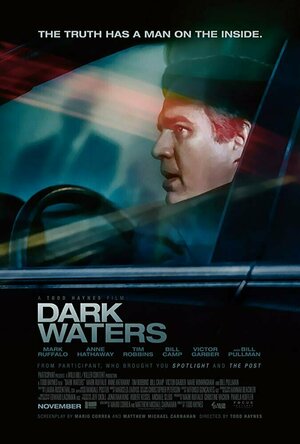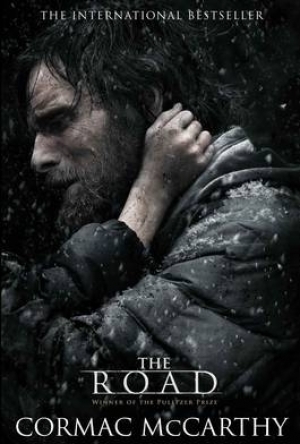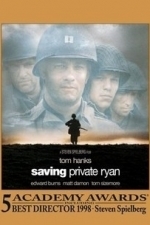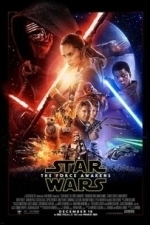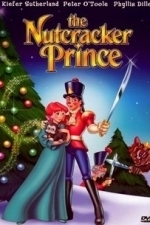156Reviews (7 KP) rated Dark Waters (2019) in Movies
May 1, 2020
Films are important to us all for many different reasons, they show what we are, what we can be, what we aspire to be, of who we are. Sometimes that comes in the form of escapism, of dreaming that we can be better, Mark Ruffalo is no stranger to the genre I'm referring to, sometimes shows us our darkest fears and that we can overcome them, and sometimes, it shows us just how low, we as people can get, and never offer any kind of redemption. Dark Waters manages to be all of these things. A small intro before the film began had me franticly signing up to numerous petitions the second the film ended, joining a cause I didn't even know existed before I sat down to watch. This is why film is important, and why you should watch Dark Waters as soon as you can. So why the 3 out of 5 rating? Surely a film that EVERYONE should watch should get top marks, right? Unfortunately not.
The film begins with Rob Bilott (Mark Ruffalo), a corporate defence attorney, whose office is visited by a farmer from his home town, trying to raise a legal case against DuPont, a multi-billion dollar business, the towns biggest employer, and a chemical company at the heart of potentially poisoning the towns water supply. As Billot investigates the scale of the issue, and its inevitable cover up, it all becomes alarmingly clear. Thousands of people are being poisoned, they're health will likely deteriorate and life threatening illnesses are now a high probability. To take a line from the recent movie Bombshell “somebody has to stand up, somebody has to get mad.”
That anger that should be felt, but for all the terrifying facts about the poisoning these people received on a daily basis, it never comes, the rage should be palpable. Instead it opts for giving us all the information, teaching about regulation and government intervention, or lack thereof, and the only temper in the film shows comes as a heated exchange in a board room that blows over as soon as it comes, and protesters outside courtrooms for fleeting moments throughout the movie. It should be seething instead of showing, giving us the knowledge we need through gritted teeth, not clinical, scientific and impersonal.
Dark Waters is off the mark with its tone, Mark Ruffalo's high-priced lawyer is too uncertain, a little too every-man, never really portrayed a hot-shot or an underdog, and the supporting cast fall into “Good Guy” or “Bad Guy” far too easily with no exploration into any depth of character. One scene has a DuPont representative, shown in great detail, every undisputable, despicable thing that his company has done to these people, and listens attentively, never upset or defiant but instead seeming slightly bored, before getting up and leaving. Every scene feels like it should be emotionally hard-hitting but never raises above a tap on the shoulder.
As the lesson goes on, the complete lack of morals DuPont has, becomes shockingly clear as they drag the case on for as long as they can, making sure Billot's firm spend more money and time than they are willing to pay. Bilot's home life becomes strained, which distracts from the main thread more than adds to it plot, he becomes distant from his wife, a woefully underused Anne Hathaway, and his health deteriorates under the weight of fighting, and in the end, the conclusion is murkier than the water supply. But he still fights, and in real life, Rob Billot is still fighting to this day to help the West Virginia community, and to change the way the corporations are regulated worldwide.
This film is important, and everyone should see it because it's message, just don't see it for its entertainment value, because that's few and far between.

Artemis Director's Viewfinder
Photo & Video and Utilities
App
Artemis Director's Viewfinder reproduces any camera, aspect ratio and lens combination. Included is...

Planner for iPad - Weekly Calendar and Tasks
Productivity and Lifestyle
App
Planner for iPad puts your weekly agenda and todo list on the same page. A calendar on the left, a...
This is a scenario people may have to face one day, especially with the shape the world is in today. Even now people are faced with sticking with their morals and values, from helping our fellow man to the decision of holding a door open for a stranger. The Road, Cormac McCarthy's Pulitzer Prize winning novel, brings the very question of humanity to the forefront, as well as how hard it is to hold onto it.
The father, The Road's main character, takes us on a journey through the mountains in a burned-out America, but the fires that took over are never explained and they didn't need to be. Apparently having been on the move for a couple of years, he wants to take his young son South to survive the winter months that are very close by. Readers get glimpses of what happened the night the grid went down from the father's point-of-view, but so many years have passed that the memories are few, the facts aren't completely straight, and any type of life before the fires seems to have been just a dream. So the two begin the story heading South, dragging everything they have scavenged in their travels inside of a metal shopping cart, and the father isn't sure they'll make it out of the mountains before winter. He only has tattered pieces of a map that they have carried for a long time, having numbered each piece with a broken crayon they had found, making it hard to estimate how far they need to travel.
While traveling, they very rarely run into other people, at one point, when they run into a very bad man, the father realizes he hasn't spoken to another person (other than his son) in at least a year. This is mostly because the majority of people that are still alive are the type of people that would rather kill you and take whatever you have than speak to you. Even most of the houses they come upon are burned and abandoned, but the father sees these buildings as a chance to find food and supplies: "The roadside hedges were gone to rows of black and twisted brambles. No sign of life. He left the boy standing in the road holding the pistol while he climbed an old set of limestone steps and walked down the porch of the farmhouse shading his eyes and peering in the windows. He let himself in through the kitchen. Trash in the floor, old newsprint. China in a breakfront, cups hanging from their hooks. He went down the hallway and stood in the door to the parlor. There was an antique pumporgan in the corner. A television set. Cheap stuffed furniture together with an old handmade cherrywood chifforobe. He climbed the stairs and walked through the bedrooms. Everything covered with ash. A child's room with a stuffed dog on the windowsill looking out at the garden. He went through the closets. He stripped back the beds and came away with two good woolen blankets and went back down the stairs. In the pantry were three jars of homecanned tomatoes. He blew the dust from the lids and studied them. Someone before him had not trusted them and in the end neither did he and he walked out with the blankets over his shoulder and they set off along the road again. " The young son is usually left close by outside because he seems scared that either there will be bad people or dead people inside.
Throughout this incredible, heart wrenching novel, the father slowly becomes more ill with what seems to be a case of pneumonia, possibly caused by all of the ash that is in the air from the fires; this makes him cough uncontrollably. Yet, he doesn't focus on that he may not live too much longer, instead he tries everything to get his son as far South as possible without too much of a plan of what to do when they get there.
The horror of this book is brought to light by the realism of what could happen if the world were to end, when people lose their humanity and begin to kill and eat their fellow humans. It leaves us wondering if we could hold onto what we are today when the basic need for shelter and food become more important than another person's life. But the father and son are examples of the few individuals who are able to hold onto their humanity during the end of the world: they share supplies if they can, they don't kill humans or animals to feed themselves, and they live by one rule: if a person is still alive, they take nothing from them.
The struggle these two go through is very real and believable, and McCarthy's writing is so well done that this book is hard to put down. Even while reading, most won't notice that there is only one character in the entire story that is given a name; our two main characters are never addressed by anything other than Papa or son/boy. The father's worry about keeping his son alive and unharmed is heartbreaking, for instance, one scene where he believes that he and his son are going to be found by cannibals, he quickly goes over with his son on how to shoot himself with the pistol, so neither of them will be taken alive. As a parent, I choked up in quite a few scenes, including this one - - - and as with the film adaptation, I cried heartily at the end.
This emotional, dark novel is an amazing book to read. The Road is bound to leave readers questioning what they would do in the same circumstances as the father. I highly recommend this book to people who love dystopian novels, but beware, this is a story you won't be able to forget.
RəX Regent (349 KP) rated Saving Private Ryan (1998) in Movies
Feb 25, 2019 (Updated Feb 25, 2019)
Winner of five Academy Awards, including Best Director for Spielberg, Best Cinematography, and Sound, which was astonishing, even by today's standards, it failed to win Best Picture, losing out to Shakespeare In Love. Shakespeare In Love! Don't get me wrong, it's a good film, but easily forgettable compared to Ryan, only proving yet again that if you touch upon the British monarchy you get Oscars.
The film is a fictional account of four brothers, all serving in the U.S. Army, three of which were killed in action on or around the D-Day landings. The fourth, James Ryan played by Matt Damon is somewhere in Europe, and Tom Hanks with his platoon are sent to bring him home, to spare his mother anymore heartache.
Tom Hanks, who was also snubbed at the 1998 Oscars for his perfect performance as Captain Miller, the everyman who was losing himself in the horrors of war, underplayed his role perfectly. He is believable on every level, emotionally, physically and has a sense of subtly with makes him of Hollywood's greats.
The action is visceral, gritty and horrifying. But never played for crass effect. Scenes of soldiers intestines spilling out, limbs flying a sunder and brutal killing left, right and centre are recreated for one purpose. To truly demonstrate the horrors of war, and to change our perceptions of the global conflict which had almost become a joke, a setting for gung- ho action films, where the Yanks reign supreme and single-handedly win the war.
This shows troops crying, hurting and making decisions which should not be made under any moral circumstances, but you understand why, whether you agree or not. There is no doubt that Spielberg is not innocent of making an American film, but it is about as even-handed as you might expect, with the exception of Tora! Tora! Tora! or The Longest Day.
So, the action is first-rate, graphic and perfectly toned to recreate to horror of the last century's greatest and most of destructive conflicts. But that's only half the story.
The other half is the talking, reminiscing and the almost sepia tone is more than a little cloying. The U.S. General's monologues, which seem to consist almost entirely of Lincoln quotations are overly sentimental, erring on the side of sloppy patriotism rather than Jingoism, which is hardly a bad thing but it isn't good either.
The civilian scenes, such as Mrs Ryan, washing a plate as she sees the car drive down to road to inform her of her sons deaths are so sentimental that they jar against the realism of the war scenes. It's not so much contrast as it is as extreme as black and white.
The action is obviously interspersed, as all war films are, with rest stops and moments of talking, pondering etc., but the scenes drag on too long and disrupt the tone of the film. On the other hand, the direction is brilliant when explaining the situations during and around the action, but Spielberg seemed to think that we needed these sloppy and often boring moments, such as The Church, and the outside the cafe in Ramelle, to express the emotional torment of the characters, but I think that these scenes are so boring and pointless that I' can hardly remember them, as my attention drifts off during them! But I do have an understanding of the soldiers, and this was achieved, quite adorably without these scenes.
Overall, this is a film of two halves if ever there was one. The battle scenes and the journey through war-torn France are brilliant, gritty and educational, but the scenes of American sentimentality are in danger of derailing the whole film. Many feel that is the best war film of all time. I do not agree, favouring Black Hawk Down over this, but I would be remiss if I didn't acknowledge that Blank Hawk Down owes a debt to Saving Private Ryan, by opening the door to the gritty war dramas of the naughties and to the style itself.
This film is on of the most important contributions to cinema ever, and has done so much to finally show to true nature of WWII and war in general. But even though I would rate this 10/10 if it was just for the war scenes, the slop just gets in the way and devalues what should have been perfection.
James P. Sumner (65 KP) rated Star Wars: Episode VII - The Force Awakens (2015) in Movies
Jun 5, 2019
So, the story. (No spoilers here, promise!) We join the action some 30 years after partying with the Ewoks on Endor. The Empire is no more, yet, like an evil phoenix, The First Order has risen from its ashes and is doing much the same thing—being awful to everyone and trying to rule the galaxy. Same old, same old.
There are plenty of new faces—the three main ones effectively being modern-day retellings of our old favourites. First up is Oscar Isaac's excellent Poe Dameron, who is this year's Han Solo. A hot-shot rebel fighter pilot, with rogue-ish good looks, a cheeky grin, and wise-cracking dialogue.
Then, we have the Stormtrooper with a conscience, played by John Boyega. A really good performance by him, and despite his character’s beginnings, it doesn't take long for you to genuinely care what happens to him. He's this year's Luke Skywalker, definitely.
And finally, there's the mysterious Rey, the tough-as-nails tomboy who's hotter than you first realise, brought to life by the uber-talented, destined-for-great-things, Daisy Ridley. Not much is known about who she is, but she's this year's Princess Leia, without a doubt.
And that was the first thing that really struck a chord with me—how the film acknowledges the original characters, but gives them a twist for the newer, younger audience. The comparisons are immediate and obvious, but they work. Instead of the kick-ass princess, you have the hard-done-by street kid... instead of the teenager dreaming of escaping his dead-end life, you have one who struggles to accept he's not meant for the exciting one he has. Kids today will relate to these things, yet the film manages to keep the essence of what made the main characters from the classic films so memorable.
We also have the new lovable droid, BB-8, who, like R2-D2 so many years ago, unwittingly finds itself with a garbled message in its memory banks, and in the possession of one of our heroes.
In much the same way that Episode IV didn’t hang about getting Darth Vader on the screen, it's not long before we're treated to our first look at the big bad—Kylo Ren. Let's run through the checklist:
• Looks cool wearing black? Check.
• Masked, with scary voice? Check.
• Mean? Check.
So, Mr. Ren starts out doing everything we would expect, which is nice. We know he's working with The First Order, we know he's looking for something... so far, so Star Wars.
The film moves along at a good pace. Plenty of action and fighting, slowed down by great interaction between the main cast where needed. Then we start getting drip-fed the old-timers, which is where the fanboy in you will get really excited. We first get a look of Han Solo and Chewbacca, which we already knew from the trailers, when Han says, "Chewy, we're home." Harrison Ford steps back into the role like putting on an old pair of shoes—a little awkward at first, but you soon remember how comfortable they are, and you're off and running in no time. It's almost like he's not played any other part since 1983 (and after Indiana Jones and the Kingdom of the Crystal Skull, I bet sometimes Mr. Ford wishes that were the case!). Accompanied by his long-time friend, he effortlessly goes through the motions as the scoundrel looking to make some money, but always ending up owing someone more than he has.
It's not long before a twist of fate puts him and Chewy alongside our new heroes, and they're on their way to see another familiar face, Princess Leia. Except she's not a Princess anymore, she's the General of the Resistance. I won't say too much about her, as her parts in the film are integral to the main storyline, and I don't want to ruin it. Suffice to say, like any couple reuniting after 30 years, her and Han are a joy to watch on screen together.
I don't want to delve into the storyline too much, because a) you've probably pieced together the gist of it from all the trailers, and b) it's hard to do without telling you things you won't know if you haven't already seen it. So I'll leave it there, but will finish by saying it's a pleasure from start to finish, it cues up the inevitable sequels well, and it does nothing more than what it should do—it gives you a Star Wars experience that leaves you wanting to watch it again the moment it finishes.
So, the downsides. There aren't many, but, for me, there are some. They don't take away from the movie as a whole, but they detracted from the experience enough to make them worth mentioning, so here goes.
Princess/General Leia - I'm sorry, but poor Carrie Fisher has had so much Botox, I genuinely thought it was a different actress when she first appeared on camera. We see her go through an emotional reunion, some heartache, some humorous banter, some thrilling, edge-of-the-seat action, and a nail-biting, jaw-dropping finale... and not once did her expression change! Probably because it couldn't. She's the only one who looked like they were struggling to revive their character, because she didn't look like a natural, older version of herself… she looked like she was trying to be a younger version of herself, and it made me not want to see her as much as other characters.
Kylo Ren - This guy starts out as being awesome. His mask is suitably evil, his voice is menacing, his lightsabre is just brilliant… But then he takes his mask off. He's doing something (which I won't detail, but is another obvious and much-appreciated nod to the film's predecessors) and he just takes off his mask. Now, no disrespect to Adam Driver, but... have you seen Harry Potter? Well, Kylo Ren, without his mask, kinda looks like he's related in some distant, in-bred way, to Neville Longbottom. He continues with his evil gestures and scary intentions, but without the mask, you just kinda think... Really? Am I meant to be scared here? When I was a kid, Darth Vader terrified the hell out of me! This guy... you could probably flush his head and steal his lunch money, if he doesn't force-choke you beforehand.
I think he’s another Hayden Christensen—horribly miscast for an important role that could’ve defined the right actor’s career. Let's hope it doesn't end up ruining it for him. Should've kept the mask on, Kylo!
Captain Phasma - The name might not mean much to casual fans, but I’m referring to the chrome Stormtrooper who has inexplicably developed somewhat of a cult following since their appearance in the trailers. They’re the tall, imposing, assumed leader of the Stormtroopers, and certainly looks the part. However, that part is so insignificant, it’s like it was written in as an after-thought. The character will apparently play a more significant role in later films, but that’s hardly the point. We first see him at the beginning, and they’re all evil and shooty, which is fine. But then we see him only a couple of times after that and, at one point, he’s taken hostage in possibly the most unimposing, least-threatening way imaginable, and he just goes along with it. What the hell?! Oh, and I say “He”, but the character is actually played by a woman—Gwendoline Christie, the tall, sword-wielding blonde from Game of Thrones. Anyway…
The final thing that annoyed me a little bit is tough to talk about, because it's riddled with spoilers. But I shall simply say this: the way a certain character (who I haven't mentioned previously) was handled could've been done so much better than it was. That's it. I'll say no more. Watch the film, then read this again. You'll know what I mean.
So, to sum up. This is a great addition to the franchise, no doubt. But, forgetting it's Star Wars for a moment, it's simply a great film. It provides everything you would want from this genre, and it leaves you wanting more at the end (with a clear indication it's going to provide it at some point in the future). Now go. Enjoy. Even if you don't like Star Wars, it's worth a watch. Though I'm pretty certain after seeing it, you'll want to watch the others.
Becca Major (96 KP) rated The Nutcracker Prince (1990) in Movies
Jan 20, 2018
The Nutcracker Prince is an enjoyable little children's movie that is a strange mashup of the novel by E.T.A. Hoffman and the popular ballet. The story is fairly simple and follows Clara as she interacts with her family at the yearly Christmas party, where she and her siblings receive the titular Nutcracker from their Uncle Drosselmeyer, as well as a golden castle. He then proceeds to tell Clara about the Nutcracker’s backstory. Then Fritz, Clara’s little brother, breaks the Nutcracker and she scolds him.
Later that night, the Mouse King attacks, attempting to kill the Nutcracker, and Clara watches the toys do battle with the Mouse King’s army. Clara ends up tripping and hurting herself, which makes her bedridden. During this time, Fritz brings her a partially eaten box of chocolates, which she puts in her nightstand drawer. Later that night, the Mouse King approaches her and threatens her. Clara offers him the box of chocolates and when he hops in the drawer to eat them, she shuts him in. She runs downstairs to protect the Nutcracker, which transitions to the second attack of the Mouse King and his army. The toys and mice battle, and eventually the Nutcracker runs the Mouse King through (off-screen of course), and the day is won.
The Nutcracker invites Clara to visit the Land of the Dolls. She does and is impressed by the beauty around her, and the Nutcracker asks her to stay and become his Queen. She turns him down, for good reasons, and everyone in the Land of the Dolls starts to turn back into lifeless objects. Then, to make everything weirder, the “dead” Mouse King shows up for one more hurrah and fights with Clara. He ends up falling over the balcony and dying. Clara returns home via “It was just a dream,” freaks out, runs to her Uncle Drosselmeyer’s house, and meets his nephew, who looks exactly like the Nutcracker, but not really.
Overall:
When all is said and done, I would have to say that I like the beginning of the movie a lot more than the end. The rules for how the magic works make sense, and the characters are pretty well defined. Clara is competitive with her siblings and thinks they are weird, and she is basically about as active as the material allows her to be. The Nutcracker himself is pretty bland and soft-spoken in comparison, but he does try his best with the situation he’s in, so I can’t dislike him. The Mouse King is somewhat threatening, if one dimensional. There isn’t much to say about the side characters. Clara’s siblings are fine, as are most of the side characters. With the exception of Marie, none of them are particularly annoying.
The music is fine, if occasionally distracting. It is Tschaikowsky, after all.
The animation is pretty good for a direct to VHS movie. The run-cycles are pretty goofy, but it flows and has detail.
I like the obvious nods to the aspects of the book that the writers changed, such as naming the new doll Marie. As someone who read the book recently, it was nice to know that they cared about the material they were adapting.
In the end, I feel that considering the movie is twenty-eight years old, it holds up pretty good. I would definitely watch it again and probably share it with the students in my class, or with my nephew.
LilyLovesIndie (123 KP) rated The Truth Seekers in Books
Nov 5, 2018
To start, I think the characters are more than worthy of a mention. Lawrence is a master of character development, and I say this after having only read one of her books, but that is honestly how strongly I feel about it. Never, in all my many books, have I come across a character as understated yet complex as Miranda. At first sight, she appears to be a simple and quite ordinary society beauty, but how very wrong that assumption would be. As the story progresses, we see her develop into a fiesty, and then broken young woman, before she regains her spark. The journey she travels is so tangible you can almost feel the emotions pouring through the pages. And that brings me onto the strange Mr Hawes. HeÕs a character and a half. Awkward, rude and at times quite objectionable, yet I still felt endeared to his situation. I find him harder to describe, as he really is so different and out of the box that itÕs refreshing against the standard ÔconformityÕ to society norms you usually find in period novels.
Something else I think really needs mentioning is the fact that this book is hugely believable. I am a huge reader of historical books, I am a great history addict and I have to say, this book ticks every single box. ItÕs full of the little quirks you would expect to see in that time Ð the language, the traditions, the vacation spots. ItÕs all just sublimely weaved together to create a total immersion into this time. It is truly like reading a modern day Jane Austen, and I mean that as the highest compliment and the greatest praise for Lawrence. It is clear that there is a huge bank of knowledge behind this writing, and that makes it so much easier and enjoyable to read. Honestly, I canÕt praise it highly enough!
At the risk of repeating myself, I am going to touch briefly on the plot for my final batch of comments because I am left slightly astounded and speechless with this book. The plot is amazing. Put very simply I know, but it is just exquisite in itÕs development, itÕs execution and itÕs whole story is just perfect. I donÕt say that very often about books, but this is so worthy of the mention. IÕm just, well, struggling to put in to words exactly how much I loved the way the story developed. The twists and turns, sudden changes, and eventually the happiness weÕve been searching for from the start, it was all woven together with immense skill and understanding for the genre and that made it such an easy book to get lost in (in the best possible way).
In conclusion, just in case you didnÕt grasp it earlier in the review Ð I freaking loved this book! It was fantastic from start to finish. A great pace, wonderful characters and a delightful storyline that kept me hooked from page one. The only thing I didnÕt like is the fact it had to end! I cannot recommend this highly enough and I will be looking forward to devouring more of Elizabeth LawrenceÕs offerings as soon as I possibly can.
ARC received with thanks and first reviewed as part of a blog tour on Lily Loves Indie - http://lilylovesindie.co.uk/?p=267

Geofency Time Tracking
Utilities and Navigation
App
GEOFENCY enables full automatic location-based time tracking on iPhone, iPad & Apple Watch, where...

Baby Milestones Live - Photo
Photo & Video and Lifestyle
App
Adding fun, adorable artwork to your photos is great, but they can seem a little lifeless, right? ...
